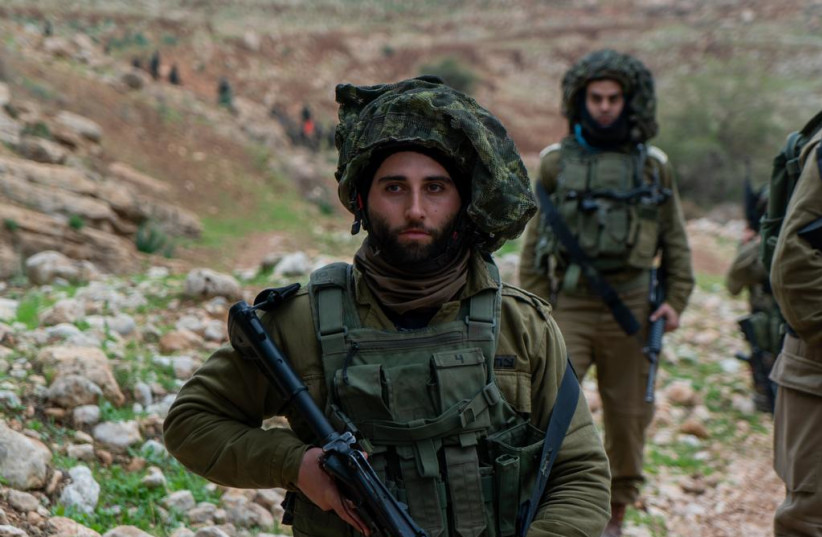Just days before the IDF canceled military training for reservists due to a spike in coronavirus infections, the 55th Paratroopers Brigade held a surprise large-scale exercise simulating war with Hezbollah along the country’s northern border.
The drill took place in the Jordan Valley while the 250 reservists from the 66th Battalion were on operational duty in the West Bank.
“War doesn’t come with a sign,” said battalion commander Col. Liron Bitton. “War always begins as a surprise. And doing these kinds of surprise drills for reservists is to make sure that they can handle war.”
Though it was a surprise, the four-day-long drill was planned for three months in order to make sure that everything would go as expected.

The drill, which simulated the next possible military campaign against Hezbollah, challenged not only the soldiers but their commanders in order to prepare them as best as possible for the next war.
“I’ve been in the military for almost 20 years and I can’t forget the outbreak of the Second Lebanon War,” he said. “It’s a change in mentality that you feel in the pit of your stomach. The change from routine to war is a big thing, especially knowing the responsibility you have for the people and country.”
According to Bitton, while not all the reservists have experienced war, many were in Operation Protective Edge in 2014 and some of the officers took part in the Second Lebanon War.
“What can I say? We are happy that there hasn’t been war, even that these soldiers haven’t experienced war. But these drills prepare them for that,” Bitton said, adding that “they have the experience and maturity. They are professional and ready should war break out.”
Israel and Hezbollah fought a deadly 33-day war in 2006, which came to an end under UN Security Council Resolution 1701 which called for the disarmament of Hezbollah, for withdrawal of the Israeli army from Lebanon, for the deployment of the Lebanese army, and an enlarged UN force in the south.
But in the years since the war, Hezbollah has morphed into a terror army with over 130,000 missiles and rockets aimed at Israel’s homefront and thousands of battle-hardened fighters, some of whom are expected to try to infiltrate into Israeli communities to kill civilians and soldiers.
With more advanced weaponry hidden in urban areas, the IDF expects that in any future conflict, whether it be against Hezbollah in the north or Hamas in the south, soldiers will have to maneuver against their heavily armed enemies entrenched in the middle of built-up civilian areas.
Ground forces will need to be deployed to conquer enemy territory and destroy its weapons stores, especially rocket launchers in order to minimize the number of missiles and rockets the enemy can fire onto the homefront.
Israel’s defense establishment has stated that any outbreak of conflict on the northern border will not be confined to just Lebanon or Syria but along the entire northern front. It will also likely see rocket fire from terror groups in the Gaza Strip as well.
“When there’s a war we don’t know what will happen. It can be one front or two or more. It all depends, but we are prepared. We have more weapons and our forces are ready. That’s our job, to be as prepared as we can be. We will do all we can during the next war in order to protect the citizens of Israel,” Bitton said.
But, the drill came as a report by military ombudsman Brig.-Gen. (res.) Eitan Dahan warned that the quality of training for reservists is in a sharp decline.
The report, which was released by Haaretz, said that there’s been a worrisome lack of training from routine to emergency scenarios and that the extent and quality of training for reserve units has “impaired the combat readiness of some units.”
The IDF was quoted by the report as saying that reserve training was disrupted over the course of the past two years because of the coronavirus, but that 2021 would see “significant emphasis planed on keeping to training cycles.”
Prior to the cancellation of all reserve training for the month of January, the IDF planned at least 74 drills compared to the seven that took place in 2020. But with the coronavirus still raging, it is likely that the number will be cut.
